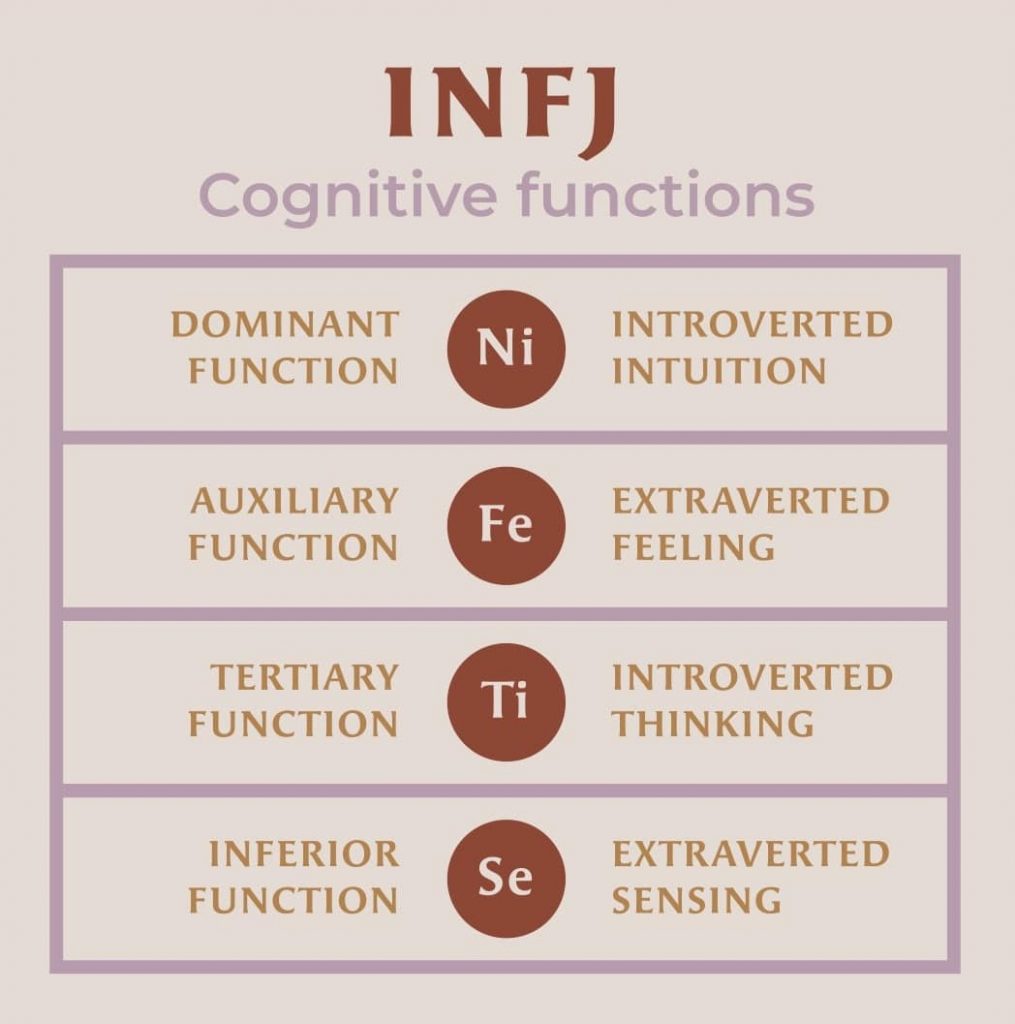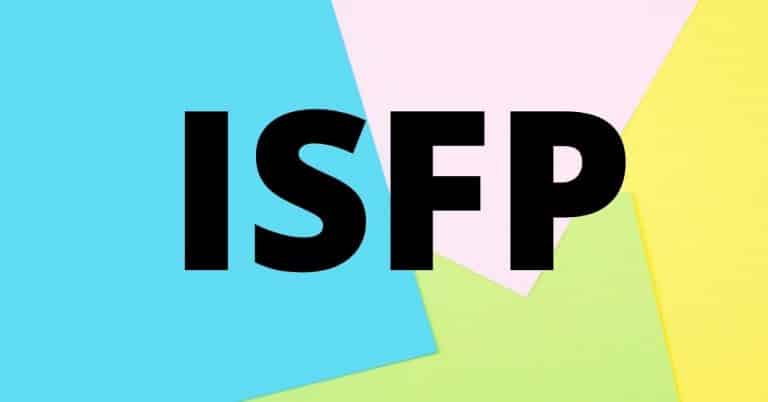INFJ – The Advocate
INFJ Meaning:
INFJ is the rarest personality type of all of the Myers-Briggs 16 personality types. Only a meager 2 percent of the population report in as INFJ, with 2 percent of women and a single one percent of men. The INFJ consists of Introvert, in that they energize themselves by looking inwardly and through intense introspection, Intuitive, in that they tend to think in terms of possibilities and concepts, Feeling, in that they often consider emotions and thoughts of others in their decisions and reasoning, and Judging, in that they prefer a logical, orderliness in both their personal and professional lives. Other names for the INFJ include the Advocate, the Idealist, and the Counselor. INFJs are profoundly people-centric and tend to focus on improving and developing the lives of others and the world.
INFJs are inspired innovators that are primarily guided by both their Introverted and Intuition tendencies. Given their Judging preference, they prefer that everything in their lives follow a specific order and routine. As such, they are very strategic and cunning in their method and approach to the world. Above all else, INFJs seek the freedom and means to pursue and realize their understanding of the world and unlock its potential in ingenious, novel, and creative ways.
INFJs love to inspire others, whether it be through genuine appreciation or by sharing their visions and ideas through usually very colorful and creative language. INFJs also love to be inspired as well, and deeply value the respect and admiration of their friends and colleagues alike.

INFJ and Career:
For the INFJ, the exact career, title, or position is not of paramount importance. Instead, INFJs crave and thrive in a job that aligns with their ideals. They are charitable and philanthropic, and are constantly thinking about and devising new and innovative ways that they can better the world.
INFJs are Introverted by nature and therefore gravitate to work environments where there is an opportunity to keep to oneself. The INFJ enjoys being alone with their thoughts so that they can order and organize them to come up with inspired and novel ideas. INFJs do not want conflict and will actively go out of their way to avoid workplaces or particular co-workers who are prone to be difficult or combative.
Instead, the INFJ works best in an organized and structured workplace that is balanced in its approach to maintaining routine and productivity as well as encouraging independent and creative thought. INFJs are not particularly fond of being micromanaged or taking step-by-step instructions. Instead, they would prefer to learn the nature of any given task or problem and apply their own rigorous method to find a solution (one that most likely has never been considered before).
INFJ as Direct Reports:
As direct reports, INFJs value competent and contributing co-workers. They appreciate others’ ideas and thoughts, even if the INFJ does not necessarily agree. In fact, the INFJ will make a point to nurture and develop those that show an interest or potential.
Although introspective and often observing, as opposed to thinking and speaking out loud for the sake of participation, the INFJ has a quiet and unspoken command of any given room or group. This is because their co-workers and leaders more often than not recognize and appreciate the subtle ingenuity, creativity, cunning, and noble intentions of the INFJ. When an INFJ does speak in a group, their words are heavy and given significant weight by all, regardless of personality type.
INFJs are welcome, appreciated, and a truly rare and valuable asset if the work environment and work itself align with their ideals. However, if an INFJ is in a position or profession that does not align with their personal values or vision, they are closed off and will most likely be looking for other opportunities that they find to be more spiritually and morally satisfying.
INFJ as Leaders of Others:
INFJs may not appear to be model leaders in the traditional or conventional sense, especially at first glance. However, INFJs have the makings for and potential to be extremely effective leaders.
INFJs are positive, compassionate, and dedicated leaders. Their enthusiasm for the betterment of humanity and people is difficult to resist or object to and often casts the INFJ in a rather heroic light amongst their direct reports. INFJs are as hardworking as they are talented and inventive and will not hesitate to jump in to assist in realizing a specific vision or direction they provide their teams.
While INFJs have the capacity and makings to be influential and nurturing leaders, they are also statistically less likely to manage a large team in comparison with the other 15 Myers-Briggs Personality types.
INFJ Professions:
While INFJs would most likely be effective at any profession they choose, it is vital that they choose a career or position that aligns with their fundamental values and beliefs. This steadfastness and unwavering stance on their values may also contribute to the statistic that INFJs have the lowest annual salary than all the other 15 Myers-Briggs personality types.
Not only this, but INFJ is genuinely at their best when they are able to apply their organized methodology and creativity to come up with new innovations and ideas to better their community and the world.
INFJs should seek out a career that is primarily focused and dedicated to charitable, philanthropic, or humanitarian causes. INFJs are well suited for the Health Care field make for successful Therapists, Physicians, Psychiatrists, Nutritionist or pharmacists. Also, INFPs would also be highly successful in Counseling and Social Services, including Counseling, Social Worker, and Child Care Worker.
Also, given their unique mind and way of thinking, they would also make excellent artists as well, including an Author, an Animator, a Graphic Designer, a Journalist, or an Editor.
Just as INFJs have clear professions and careers that they would be well suited towards, there are some careers or occupations that the INFJ should seriously consider before entering. Any position that is not in alignment with their ideals should be avoided, as well as those that may stifle their independence and creative thought. Therefore, careers for the INFJ to avoid would include, Contractor work, Electrician, Farmer, Military Officer, Police Officer, Mechanic, Sales Manager, Financial Manager, among others.

INFJ and Interpersonal Relationships:
INFJs are chiefly private in their personal lives and usually maintain a small but intimate social circle. They enjoy being in the presence of the thoughts and ideas of others, however, not for prolonged periods of time, as they also require time for reflection, introspection, and re-energizing, given their tendency towards Introversion. While this is a healthy and natural response to outside stimulation, the INFJ should take care not to withdraw too often or too much. This withdrawal can result in a certain detachment from the world, one that not many other personality types may understand. As such, the INFJ should approach their introspection as they approach most other aspects of their lives, with a measured balance and harmony,
INFJs value and seek peace and harmony above all else and tend to avoid the more domineering or invasive personality types.
INFJ in Friendships:
INFJs also enjoy the company and friendship of other personality types that share the same views and ideals, such as the ISFJ (Introvert, Sensing, Feeling, and Judging), the INFP (Introvert, Intuitive, Feeling and Perceiving), the ENFJ (Extravert, Intuitive, Feeling and Judging), as well as other INFJ personality types. These personality types tend to bond primarily over their Feeling preference, as well as their Judging and Intuitive preferences.
While these personality types are more likely to share common beliefs and values, and bonds, this does not necessarily mean that they will always get along. Relationships take effort and compromise, especially for those that tend to be Introverted. As such, these personality types have the potential to gel well together, but only if there is a concerted effort from both parties.
Also, as these personality types share common values and interests and have more opportunities to find common ground and bond, the same can be said for those personality types that have little to no commonalities. These primarily include those personality types who tend to Thinking over Feeling and those who prefer Perceiving over Judging. These personality types include the ISTP (Introvert, Sensing, Thinking and Perceiving), the ESTP (Extravert, Sensing, Thinking and Perceiving), the ESTJ (Extravert, Sensing, Thinking and Judging) as well as the ESFP (Extravert, Sensing, Feeling and Perceiving). Again, this is not to say that these personalities cannot work. However, they are intrinsically more challenging given the difference in core values and opinion.
INFJ in Romantic Relationships:
In romantic relationships, INFJs are profoundly passionate and devout. However, they will always continue to value and protect their independence in thought and ideas above all else. This is to say, if the INFJ is in a relationship with personality types who agree with, appreciate, and respect the INFJ’s tendency for Introversion and introspection, there will be little to no friction on the side of the INFJ.
INFJs tend to seek out partners who share their altruism and passion for humanitarianism, as these are fundamental and defining values for the INFJ. If an INFJ finds themselves with a personality type that neglects or does not place merit on the Feelings, thoughts, emotions, and the quality of life of others, there is potential for difficulty within the relationship. INFJs avoid conflict. However, if there is any slight or assault on those ideals and values that they hold close and that are at the core of their identity, they will defiantly speak out.
When in a compatible, nurturing, and conducive relationship, the INFJ will be harmonious and nurturing. They place an exceptionally high value on emotions within a relationship given their Feeling preference. They, therefore, are highly attuned to the feelings and emotions of their partner and expect the same from their partner as well.
INFJ and Families:
In a family setting and dynamic, the INFJ can be exemplary. INFJs tend to make profoundly caring and nurturing parents who develop deeply powerful relationships with their children. The INFJ allows much autonomy for their children intellectually and spiritually. However, they do tend to instill their core values and beliefs in their children as well.
Conclusion:
It can be argued that the world could use more INFJs, and it seems truly unfortunate that report in as the least common personality among the other 15 Myers-Briggs personality types. They are compassionate, altruistic humanitarians who have a very unique perspective and view of the world. They are creative and innovator thinkers who prefer to work independently and to work for a greater good or cause.
In relationships, they tend to work best with other Feeling personality types, as they both place a high value on the emotions and feelings of others. They tend to have few but strong interpersonal relationships and tend to be very private and reserved in their personal lives.
You can find information on famous people with INFJ personality types such as celebrity actors, sportsmen, characters and other historical characters with this personality type.







